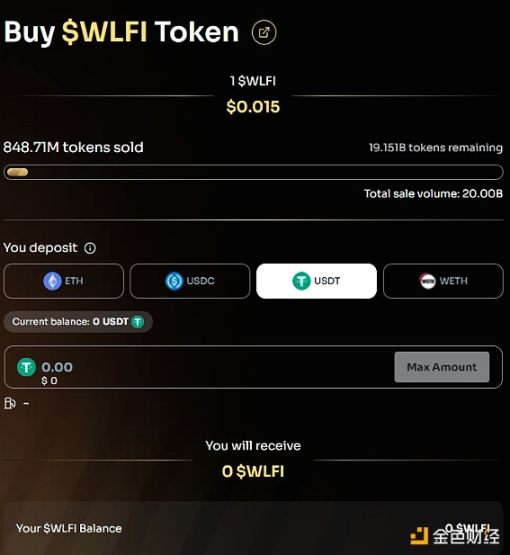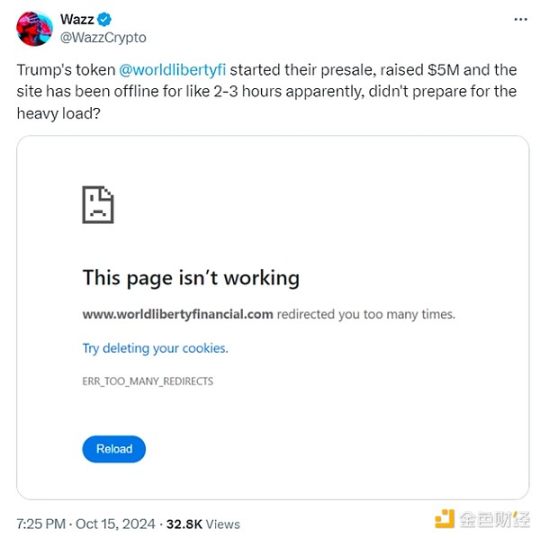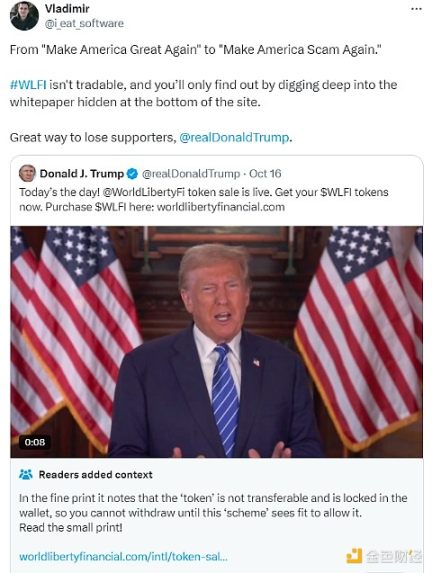Restrictions on buyers, WLFI non-transferable, website crashes…
Written by: Christopher Roark
Translated by: Tao Zhu, Golden Finance
The token issuance by former U.S. President Donald Trump is, to some extent, a failure.
On October 16, former U.S. President Donald Trump launched his World Liberty Financial (WLFI) token. The token's website claims it will allow investors to gain voting rights on future decentralized finance (DeFi) protocols.
However, after nearly a full day of trading, the token's sales have been lackluster. As of 10:00 AM UTC on October 17, the token's website showed that only 848.63 million WLFI tokens (valued at $12.7 million based on the presale price) had been sold, with 19.1 billion tokens ($287 million) remaining unsold. The first day's sales accounted for only 4.24% of total sales.

Quantity of WLFI tokens sold. Source: World Liberty Financial.
The following five reasons can explain the token's surprisingly poor performance.
Limited Buyer Eligibility
Unlike most token presales that are open to anyone and can be purchased anonymously, only certified U.S. investors or non-residents are allowed to purchase the Trump DeFi token.
When users first visit the website, the system asks whether they reside in the U.S. and "meet the requirements defined as 'accredited investors' under Regulation D of the 1933 U.S. Securities Act," or if they live outside the U.S.
Users who do not fall into either category are not allowed to proceed further on the website.
Buyers must first pass a "Know Your Customer" (KYC) check to verify their identity before they can obtain the tokens. It is presumed that those claiming to be U.S. residents must provide a sworn statement proving they are accredited investors to pass this check.
According to Investopedia, U.S. resident investors are only considered "accredited" if they have an annual income exceeding $200,000, a net worth exceeding $1 million, or are general partners, executives, or directors of a company issuing unregistered securities.
These criteria effectively exclude the vast majority of Americans.
Users can bypass this requirement by clicking "I live outside the U.S.," but they must then provide proof of residence outside the U.S. to continue.
In fact, many of Trump's supporters live in the U.S. and are not accredited investors, which may be a primary reason for the token's weak sales.
Generally, such requirements can be easily circumvented. Cryptocurrency users outside the U.S. can purchase tokens from the website and then sell them to U.S. residents through decentralized exchanges.
U.S. residents purchasing tokens would use a crypto address to identify themselves, making it nearly impossible for the government to determine whether they are U.S. residents, providing sellers with a reasonable excuse.
However, this is not the case with Trump's WLFI token, as the token is non-transferable.
WLFI Non-Transferable or Tradable
Unlike most cryptocurrencies, WLFI cannot be transferred from one wallet to another. This means that accredited investors cannot sell the tokens to unaccredited investors, and anyone outside the U.S. cannot sell them to U.S. residents.
In fact, holders cannot sell the tokens at all. The only thing they can do with the tokens is wait for the DeFi protocol to launch, at which point the developers claim that holders will be able to vote on proposals affecting the protocol.
The terms and conditions of the token sale explicitly state that the tokens cannot be transferred to other users.

Terms and conditions of WLFI sale. Source: World Liberty Financial.
The inability to sell the tokens means that investors cannot profit by selling the tokens at a higher price, and token holders cannot gain any profit from the upcoming DeFi protocol.
Website Crashed
Despite only a few hundred million tokens being sold, the website could not even handle such a small amount of traffic. Some users reported encountering a "This page is not working" message when they tried to purchase tokens.

Source: Wazz
Due to the website being down, some users may have been unable to purchase WLFI, and after reconsidering their plans, they may have changed their minds and decided to keep their money. This could further reduce token sales.
The WLFI team has not explained the reason for the website crash, but they may have anticipated worse sales than originally expected. Therefore, they may not have prepared enough servers to handle the website's traffic, leading to the crash and worsening the situation.
Perception of a Scam
Another reason for the weak token sales may be the widespread belief that the project is a scam or a small-time con.
Some observers have suggested that the issue of lack of transferability was intentionally concealed from buyers to sell more tokens.
Although the lack of transferability is clearly stated on the token's website, some believe the project did not expect buyers to read the fine print.
Trump's announcement of the token launch on X sparked significant controversy, drawing community attention. The notice pointed out, "In the fine print, it states that 'the tokens' are non-transferable and locked in wallets, so you cannot withdraw the tokens until the 'program' deems it appropriate. Please read the fine print!"
Reflecto passive income token founder Vladimir Djukic shared this news:

Vladimir
Cumbersome Purchase Process
Another reason for the weak token sales may be that the purchase process is too frustrating for many potential investors.
Some may not know whether they are accredited investors, as they may not even understand the meaning of the term.
Others may be uncertain about what "living" in the U.S. means. For example, if a person visits the U.S. for a few months each year but spends the rest of the time in another country, they may be unsure which button to press.
Even if they reach the token sale page, they must first pass the KYC check before they can proceed to the final step of purchasing. Some users may distrust the company conducting the KYC check, Sumsub, and may be unwilling to upload their passport or driver's license.
Even if they are willing to trust the company conducting the KYC check, they may simply be unwilling to upload their documents.
The overall tediousness of the purchasing process may be another reason many supporters decided to skip the token sale, even if they believe the token will yield returns in some way in the long run.
Despite the poor token sales, Trump still has the support of many in the U.S. cryptocurrency community. According to the Federal Election Commission, a political action committee allied with Trump raised over $7.5 million in cryptocurrency from July to September.
According to research by Galaxy Digital, Trump's opponent, Vice President Kamala Harris, is also considered more suitable for cryptocurrency than current President Joe Biden.
She recently attempted to attract cryptocurrency voters by promising reasonable asset regulation as part of her "Opportunity Economy Commitment."
免责声明:本文章仅代表作者个人观点,不代表本平台的立场和观点。本文章仅供信息分享,不构成对任何人的任何投资建议。用户与作者之间的任何争议,与本平台无关。如网页中刊载的文章或图片涉及侵权,请提供相关的权利证明和身份证明发送邮件到support@aicoin.com,本平台相关工作人员将会进行核查。



